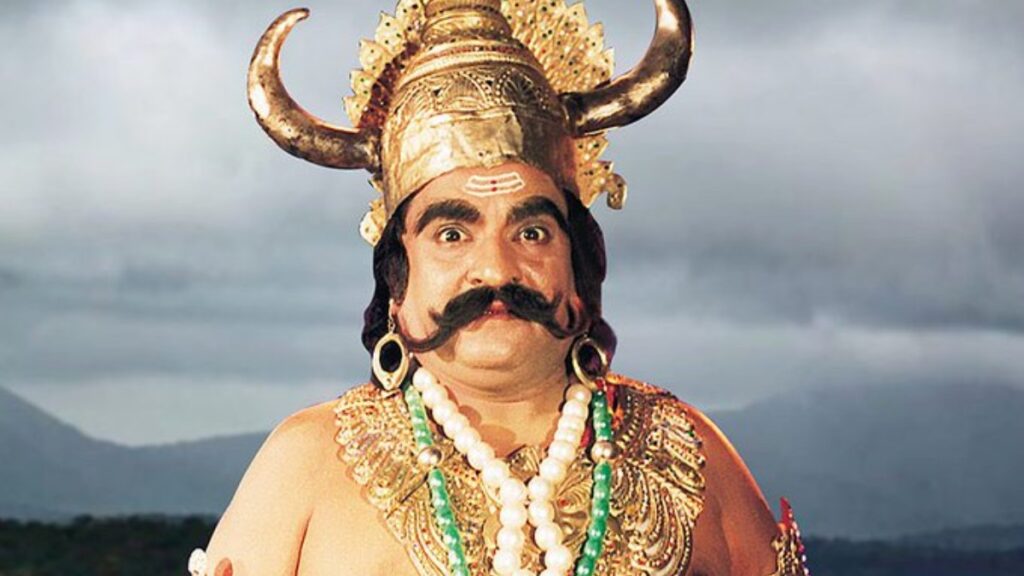In the timeless epic of the Ramayana, the role of Kumbhakaran stands as a captivating and enigmatic character. Often overshadowed by his more prominent siblings, Ravana and Vibhishana, Kumbhakaran’s presence is both fearsome and tragic. As the colossal demon with an insatiable appetite and legendary prowess in battle, his awakening plays a pivotal role in the epic’s unfolding drama. Yet beneath the surface, Kumbhakaran’s complexity as a character raises thought-provoking questions about loyalty, destiny, and the consequences of one’s choices in the grand tapestry of the Ramayana.
Kumbhakaran’s Birth and Boon
Kumbhakaran, the younger brother of Ravana, the demon king of Lanka, was born to the sage Vishrava and his wife Kaikasi. Unlike his brother Ravana, Kumbhakaran was not inherently evil. His life took a significant turn when he undertook severe penance to please Lord Brahma, the creator of the universe. Impressed by his devotion, Lord Brahma appeared before him and offered him a boon. However, Kumbhakaran’s request for invincibility was tainted by a momentary lapse of reason. Instead of asking for the ability to defeat his enemies, he mistakenly asked for uninterrupted sleep.
Also read – The Enigmatic Role of Bali in Ramayana: Unveiling the Power of the Monkey King
The Consequence of a Fateful Boon
Kumbhakaran’s request for perpetual sleep had grave consequences. Lord Brahma granted his wish, but this boon became a curse in disguise. Kumbhakaran would sleep for six months at a stretch and remain awake for the other half of the year. This curse of prolonged sleep turned him into a formidable but misunderstood character in the Ramayana.
Also read – The Role of Sugriva in Ramayana: A Tale of Loyalty and Friendship Introduction
Also read – Ayodhya’s Architectural Heritage: Exploring the Richness of Its Temples
Kumbhakaran’s Unique Role
Despite his colossal size and fearsome appearance, Kumbhakaran was not inherently malicious. He was a victim of circumstances, trapped by the consequences of his boon. His role in the Ramayana is multifaceted and goes beyond being just a fearsome demon.
- Defender of Dharma: Kumbhakaran upheld dharma, the moral and ethical order, even within his demoniac nature. When Ravana kidnapped Sita, the wife of Lord Rama, and held her captive in Lanka, it was Kumbhakaran who spoke up against the abduction. He reminded Ravana of the consequences of his actions and advised him to return Sita to Lord Rama. Kumbhakaran’s sense of righteousness and his commitment to dharma is evident in this pivotal moment.
- Unwitting Participant in the Battle: Kumbhakaran was an unwitting participant in the war between Lord Rama and Ravana. When Ravana woke him from his deep slumber and informed him about the ongoing war, Kumbhakaran was filled with rage at the injustice done to his nephews. He decided to fight alongside his demon brethren, albeit against his will. His participation in the battle was a testament to his loyalty to his family.
- Force of Nature: Kumbhakaran’s sheer physical prowess and combat skills were unparalleled. In the battlefield, he wreaked havoc on Lord Rama’s army, causing immense destruction. His titanic stature and the devastation he unleashed made him a formidable adversary.
- Noble Sacrifice: The turning point in Kumbhakaran’s role came when he encountered Lord Rama himself on the battlefield. Despite putting up a fierce fight, Kumbhakaran was ultimately defeated. In his final moments, he came to understand the noble purpose behind Lord Rama’s mission and earnestly implored for absolution for his deeds. Moved by his sincerity, Lord Rama graciously pardoned Kumbhakaran, bestowing upon him moksha, which freed him from the relentless cycle of life and death. Kumbhakaran’s noble sacrifice showcased his transformation from a formidable demon to a redeemed soul.
Conclusion
In the epic Ramayana, the role of Kumbhakaran stands as a captivating portrayal of contrasts and complexity. Often overshadowed by his more prominent brother Ravana, Kumbhakaran’s character exemplifies the consequences of blind loyalty and the power of redemption. His immense strength and insatiable appetite symbolize the duality of human nature, reminding us that even seemingly formidable adversaries can harbor hidden virtues. Kumbhakaran’s ultimate sacrifice for righteousness illustrates that redemption and the potential for change exist within us all, making him a thought-provoking figure in the timeless tale of Ramayana.
Also read – How to Make Navratri Special: Celebrating 11 Days of Festivity
